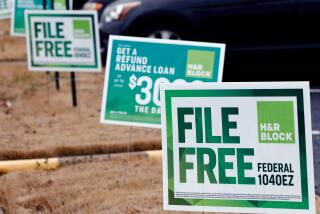Tax Collectors in Northeast Target Southland Firms : Revenue: Mailed surveys may be followed by visits from auditors. States are trying to collect unpaid corporate taxes.
- Share via
Aggressive tax collectors from five Northeastern states have focused on Southern California in their joint effort to collect millions of dollars in unpaid corporate and sales taxes.
Detailed questionnaires have been sent to 1,700 Southern California companies by the New York state Taxation and Finance Department. The survey seeks information about all business that the companies conduct in New York, Pennsylvania, New Jersey, Connecticut or New Hampshire.
Companies that fail to return the three-page survey will be targeted for a personal visit by a tax auditor from one of the five states during a blitz planned for late April, George Bradford, director of New York’s Revenue Enhancement Bureau, said Wednesday.
“I would hope to recover several million dollars in Southern California,” Bradford said. “Every state needs money desperately, and this is a way of generating revenue without increasing taxes.”
Last April, 20 tax auditors from the five Northeastern states visited 1,470 Northern California-based high-technology companies. Their efforts netted $500,000 in unpaid corporate and sales taxes, Bradford said.
He said the collectors are targeting fast-growing firms that solicit customers in other states or have employees, sales offices and inventory outside of their home state.
The tax auditors create lists of companies to question by reading business publications, attending industry trade shows and swapping information with other government agencies, Bradford said.
Bradford said New York is leading the pack of states pursuing unpaid business taxes. In recent months, auditors and other tax professionals from 15 states have visited Bradford and his 45-member staff to learn how it’s done.
Hearing from out-of-state tax officials may soon become commonplace for U.S. businesses. Currently, 45 states impose sales or use taxes. Twenty-six states have enacted laws holding out-of-state companies liable for sales tax on goods sold to residents.
At issue is the question of “nexus,” the level at which a company’s contact with a state subjects it to that state’s tax laws. In 1988, California enacted legislation requiring mail-order companies doing business with California consumers to collect state sales tax.
Several direct mail companies and industry groups filed suit to block the requirement by California and other states. Until recently, direct mail companies relied on a 1967 U.S. Supreme Court decision that held that companies only selling merchandise through the mail cannot be held responsible for collecting sales tax. At least one case involving sales tax payment by mail-order companies is pending before the U.S. Supreme Court.
As federal revenue-sharing has declined in recent years, states have taken a more aggressive approach to collecting corporate and sales taxes, according to Arthur Gelber, a state and local tax expert in Laventhol & Horwath’s New York office.
“One of the alternatives to raising taxes is to aggressively administer the tax laws on the books,” said Gelber. “The states are in business and are in competition with each other the same as private enterprise is.”
Gelber said that if every state takes New York’s aggressive approach, “state and local taxes could very well be more expensive than the federal income tax bite.”
Ed Rosenson, tax partner in Ernst & Young’s entrepreneurial services group in Century City, said he is advising clients to respond to the questionnaire.
He said that although it may be more expensive to do business in other states if all the necessary taxes are paid, “I don’t think it will seriously change the way business is done.”
More to Read
Inside the business of entertainment
The Wide Shot brings you news, analysis and insights on everything from streaming wars to production — and what it all means for the future.
You may occasionally receive promotional content from the Los Angeles Times.










